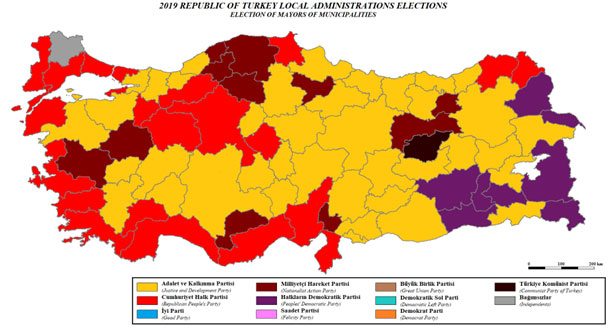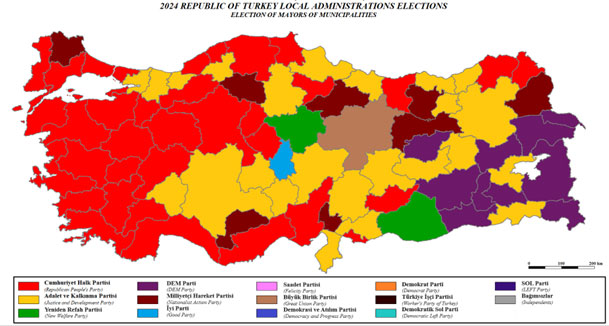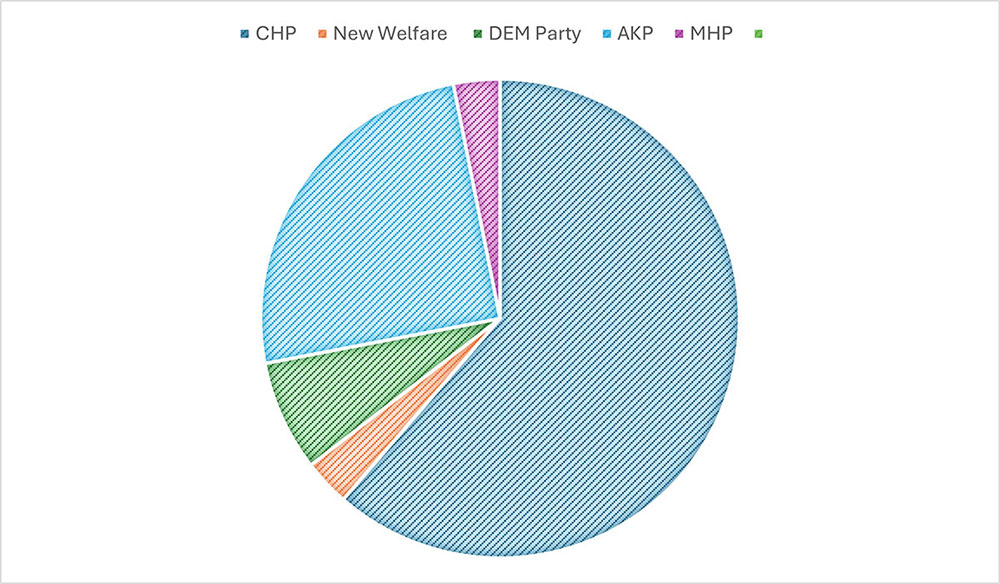On March 31, 2024, Turkey went to the polls to elect its local leaders. For President Erdoğan and the ruling Justice and Development Party (AKP), who emerged victorious in the Presidential and Parliamentary elections held in May 2023, these local elections also carried the significance of a “vote of confidence”.
However, the people did not reward Erdoğan and his party this time. The main opposition Republican People’s Party (CHP) was victorious in many cities, especially in the big cities of Istanbul, Ankara and Izmir. The CHP increased the number of metropolitan municipalities from 11 to 14 and the total number of provincial municipalities from 21 to 35.
When the municipalities won by other opposition parties are added to the total, it is clear that the AKP has lost “local power” across Turkey. The two maps below clearly illustrate this transformation. In Map I which shows the results of the 2019 elections, the AKP (yellow) and its partner MHP (brown) won almost three quarters of the country, while in the second map, which reflects the outcome of the 2024 elections, Turkey by and large reflects the colors of the opposition parties. In the March 31 elections, Turkey changed its shell; while the AKP is melting in every region of the country, the opposition gained a majority, albeit locally:
Map I: 2019 local election results:

Map II: 2024 local election results:

In short, the local elections held on March 31 2024 in Turkey marked a significant turning point in the country’s political landscape. President Recep Tayyip Erdoğan’s party, the Justice and Development Party (AKP), faced a substantial defeat, which has far-reaching consequences for both domestic politics and international relations.
| PARTY | POLTICAL POSITION | OVERALL VOTE PERCENTAGE (31 March 2024 elections) |
| CHP | Social democrat, main opposition | 37,72 |
| AKP | Governing party led by President Erdoğan | 35,52 |
| New Refah Party | Islamist | 6,18 |
| DEM | Left, Kurdish | 5,65 |
| MHP | Far right, Erdoğan’s supporter | 4,98 |
According to these results, the AKP lost its position as the “largest party” to the CHP for the first time in 22 years and was relegated to the second party position.
Why did Erdoğan and his AKP, which emerged victorious from the elections in May 2023, suffer defeat 11 months later?
It is also possible to ask this question as follows: Were the March 31 elections won by the CHP and the opposition, or did the AKP lose? In other words, did voters prefer the promises and programs of the opposition parties, or did they punish the AKP? Whichever question we ask, the result will not change, but which question is asked is important for the future of Turkey.
In our opinion, both have happened. Probably in previous elections, a significant mass of voters could have broken away from the AKP, but there was no opposition party, no “other option” to give them the courage to do so.
The CHP underwent a change of leadership after May 2023. On November 5 2023, the Party held its Congress and delegates elected Özgür Özel, a young and ambitious politician, to replace Kemal Kılıçdaroğlu, who had led the party for 13 years. Kılıçdaroğlu had lost all his electoral races against Erdoğan. His last defeat was in the May 2023 elections and the CHP said “enough is enough”.
Özgür Özel quickly moved the party to a more leftist line, gave his cadres “hope for power”, took clear positions on the issues occupying people’s agenda and took the opposition to the streets when necessary. This dynamism and active opposition created hope not only among the CHP base but also among the “discontented” masses looking for an alternative.
Of course, the change in the CHP was not the only factor in the AKP’s defeat. The collapsed economy, inflation approaching 100 percent, the breathtaking increase in prices and the erosion of salaries, rapid impoverishment, corruption files that could no longer be covered up, constant interference in lifestyles, in short, “bad governance” were in fact the main reasons for the AKP’s loss of votes. The economic collapse was compounded by 22 years of absolute power, which had been accompanied by the brutality and recklessness, the almost complete detachment from the people and the problems of the street, and the spoiled and reckless behavior of the small privileged groups that had been created. It was at this point that the CHP was able to present itself as an alternative with the right and appropriate dynamism.
Of course, the success of the CHP mayors who have been governing Istanbul and Ankara since 2019 also contributed significantly to the CHP’s victory. As a result, the CHP was able to become an address for those who wanted to “teach the AKP a lesson”.
According to the Turkish Statistical Institute (TÜİK), Turkey’s population reached 85 327 000 by the end of 2023. According to the results of the March 31 elections, only 25 percent of this population now lives in municipalities run by the AKP, while 75 percent is controlled by the opposition.
The population living in CHP municipalities is approximately 52 million. In other words, 60.65 percent of Turkey’s population lives in municipalities governed by the CHP. In the 2019 elections, this rate was 48.4 percent.

According to these results, the contribution to the national economy has also changed dramatically. According to data published by “Ekonomim” newspaper, while the contribution of the provinces won by the opposition parties in the 2019 elections was 66.05 percent of the national income, the contribution of the provinces won in the 2024 elections increased to a total of 77.7 percent. In this context, the contribution of CHP municipalities increased from 62.52 percent to 73.41 percent, while the contribution to the GDP of provinces controlled by the AKP decreased from 30.77 percent to 19.44 percent, and the contribution of provinces governed by the ruling partner MHP decreased from 3.99 percent to 2.12 percent.
In other words, more than 2/3 of the national wealth now is produced in cities controlled by opposition parties. It is safe to say that this phenomenon will deeply affect the balance between central government (controlled by Erdoğan) and local government.
The loss of control in major municipalities presents practical challenges for the AKP. Local governments in Turkey have significant influence over urban planning, infrastructure projects, and social services. With opposition parties now in control of these municipalities, there may be increased scrutiny and challenges to the central government’s policies. This could lead to more transparent and accountable governance at the local level, as well as potential conflicts between local and national authorities.
Turkey’s economy has been under strain in recent years, with high inflation, unemployment, and a depreciating currency. The election results could impact economic policies and investor confidence. Opposition-led municipalities might implement new economic strategies aimed at improving local economies, potentially offering a counter-narrative to the AKP’s approach. However, political instability and potential clashes between local and central governments could also deter foreign investment and complicate economic recovery efforts.
Erdoğan’s defeat may embolden civil society and grassroots movements. Over the years, there has been increasing concern about the erosion of democratic norms and freedoms in Turkey. The success of opposition parties in the local elections could revitalize efforts to protect and expand civil liberties. This shift might also lead to a more vibrant and pluralistic public discourse, as opposition-led municipalities promote diverse cultural and social initiatives.
Erdoğan’s defeat in the local elections raises questions about the long-term viability of his leadership and the AKP’s dominance. While Erdoğan remains a formidable political figure, the election results suggest that his hold on power is weakening. This could set the stage for more competitive national elections in the future, with opposition parties gaining momentum and potentially posing a serious challenge to Erdoğan’s presidency.
The local elections on March 31 2024 mark a critical juncture in Turkish politics. Erdoğan’s defeat has set in motion a series of changes that will shape the country’s political, economic, and social landscape in the coming years. The consequences of this shift will be closely watched both within Turkey and by the international community, as they hold significant implications for the future direction of the nation.
Peščanik.net, 26.06.2024.


